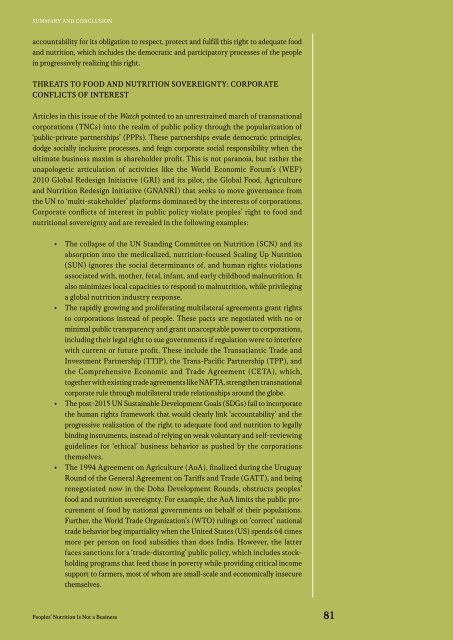RIGHT TO FOOD AND NUTRITION WATCH
1iNBHTY
1iNBHTY
You also want an ePaper? Increase the reach of your titles
YUMPU automatically turns print PDFs into web optimized ePapers that Google loves.
SUMMARY <strong>AND</strong> CONCLUSION<br />
accountability for its obligation to respect, protect and fulfill this right to adequate food<br />
and nutrition, which includes the democratic and participatory processes of the people<br />
in progressively realizing this right.<br />
THREATS <strong>TO</strong> <strong>FOOD</strong> <strong>AND</strong> <strong>NUTRITION</strong> SOVEREIGNTY: CORPORATE<br />
CONFLICTS OF INTEREST<br />
Articles in this issue of the Watch pointed to an unrestrained march of transnational<br />
corporations (TNCs) into the realm of public policy through the popularization of<br />
‘public-private partnerships’ (PPPs). These partnerships evade democratic principles,<br />
dodge socially inclusive processes, and feign corporate social responsibility when the<br />
ultimate business maxim is shareholder profit. This is not paranoia, but rather the<br />
unapologetic articulation of activities like the World Economic Forum’s (WEF)<br />
2010 Global Redesign Initiative (GRI) and its pilot, the Global Food, Agriculture<br />
and Nutrition Redesign Initiative (GNANRI) that seeks to move governance from<br />
the UN to ‘multi-stakeholder’ platforms dominated by the interests of corporations.<br />
Corporate conflicts of interest in public policy violate peoples’ right to food and<br />
nutritional sovereignty and are revealed in the following examples:<br />
••<br />
The collapse of the UN Standing Committee on Nutrition (SCN) and its<br />
absorption into the medicalized, nutrition-focused Scaling Up Nutrition<br />
(SUN) ignores the social determinants of, and human rights violations<br />
associated with, mother, fetal, infant, and early childhood malnutrition. It<br />
also minimizes local capacities to respond to malnutrition, while privileging<br />
a global nutrition industry response.<br />
••<br />
The rapidly growing and proliferating multilateral agreements grant rights<br />
to corporations instead of people. These pacts are negotiated with no or<br />
minimal public transparency and grant unacceptable power to corporations,<br />
including their legal right to sue governments if regulation were to interfere<br />
with current or future profit. These include the Transatlantic Trade and<br />
Investment Partnership (TTIP), the Trans-Pacific Partnership (TPP), and<br />
the Comprehensive Economic and Trade Agreement (CETA), which,<br />
together with existing trade agreements like NAFTA, strengthen trans national<br />
corporate rule through multilateral trade relationships around the globe.<br />
••<br />
The post-2015 UN Sustainable Development Goals (SDGs) fail to incorporate<br />
the human rights framework that would clearly link ‘accountability’ and the<br />
progressive realization of the right to adequate food and nutrition to legally<br />
binding instruments, instead of relying on weak voluntary and self-reviewing<br />
guidelines for ‘ethical’ business behavior as pushed by the corporations<br />
themselves.<br />
••<br />
The 1994 Agreement on Agriculture (AoA), finalized during the Uruguay<br />
Round of the General Agreement on Tariffs and Trade (GATT), and being<br />
renegotiated now in the Doha Development Rounds, obstructs peoples’<br />
food and nutrition sovereignty. For example, the AoA limits the public procurement<br />
of food by national governments on behalf of their populations.<br />
Further, the World Trade Organization’s (W<strong>TO</strong>) rulings on ‘correct’ national<br />
trade behavior beg impartiality when the United States (US) spends 64 times<br />
more per person on food subsidies than does India. However, the latter<br />
faces sanctions for a ‘trade-distorting’ public policy, which includes stockholding<br />
programs that feed those in poverty while providing critical income<br />
support to farmers, most of whom are small-scale and economically insecure<br />
themselves.<br />
Peoples’ Nutrition Is Not a Business 81


